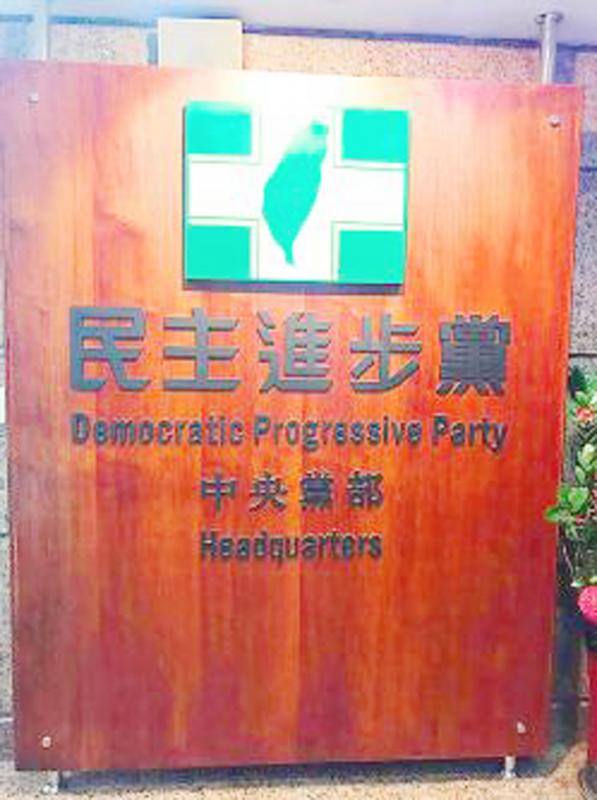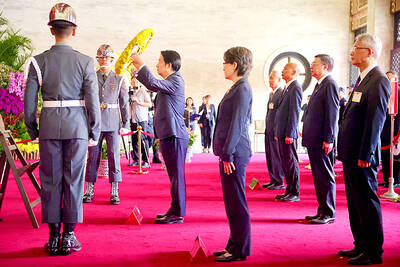Nearly 80 percent of the public prefer a lay judge system over a jury system, a survey conducted by the Democratic Progressive Party (DPP) showed.
The DPP has come under fire for not including a proposed jury system on the agenda for legislative talks on judicial reform, despite the party’s charter calling for a jury system. It has instead pushed for a lay judge system, which was initially proposed by the Judicial Yuan.
Although the Judicial Yuan has called the proposed bill the “citizen participation in criminal trial procedures act,” the DPP caucus proposed naming it the “national judge act,” removing words such as “participation,” which it says might not fit the final language of the bill.

Photo: Su Fun-her, Taipei Times
The survey, released on Sunday, showed that 78.2 percent of respondents support a “national judge system,” while only 19.2 percent support a jury system.
The poll also showed that 72.2 percent agree with President Tsai Ing-wen’s (蔡英文) push to have members of the public take part in trials, while 19.3 percent said they disagree.
The survey showed that, on the basis that in a national judge system, the judges would be required to justify their rulings, and fact-finding can be appealed, whereas in a jury system the jury does not have to state reasons for their ruling nor can fact-finding be appealed, 80 percent said they support a national judge system, while 14.7 percent said they support a jury system.
The majority, or 56.7 percent, also disagree that lay judges would have too much authority, while 36.8 percent agree that they would have too much authority, the survey showed.
Asked if they agree that juries might be a waste of resources because they have to be disbanded and a new jury formed when members could not reach a consensus, 74.4 percent of respondents said yes, while 21.5 percent said no.
On Sunday, the Judicial Yuan and the Ministry of Justice each issued a statement saying that the proposed national judge system was the most suitable of the two options for the nation, and urged the government not to implement both at the same time.
The national judge system represented an “evolution of the jury system,” the statement said.
Transplanting the jury system used in the US or the UK into Taiwan’s judiciary would create a human rights crisis for Taiwanese, it said.
The New Power Party, in support of a proposal by the Judicial Reform Foundation, yesterday submitted a motion at a cross-party caucus meeting calling for the implementation of a jury system in parallel with a lay judge system.
Opposing the motion, Saber Youth (劍青檢改) — a judicial independence advocacy group composed of young prosecutors — urged the DPP not to concurrently implement both systems, saying that doing so would result in a “judicial monster.”
The proposed lay judge system was formulated after four years of discussions involving judges and prosecutors, and looking at examples in Japan, the group said.
They had conducted 86 trial runs in mock court sessions and gathered a large amount of information in the process, it added.
The survey was conducted from Wednesday to Friday last week and collected 911 valid samples. It has a margin of error of 3.2 percentage points.
Additional reporting by Chen Wei-tzu and Wen Yu-te

RESPONSE: The transit sends a message that China’s alignment with other countries would not deter the West from defending freedom of navigation, an academic said Canadian frigate the Ville de Quebec and Australian guided-missile destroyer the Brisbane transited the Taiwan Strait yesterday morning, the first time the two nations have conducted a joint freedom of navigation operation. The Canadian and Australian militaries did not immediately respond to requests for comment. The Ministry of National Defense declined to confirm the passage, saying only that Taiwan’s armed forces had deployed surveillance and reconnaissance assets, along with warships and combat aircraft, to safeguard security across the Strait. The two vessels were observed transiting northward along the eastern side of the Taiwan Strait’s median line, with Japan being their most likely destination,

‘NOT ALONE’: A Taiwan Strait war would disrupt global trade routes, and could spark a worldwide crisis, so a powerful US presence is needed as a deterrence, a US senator said US Senator Deb Fischer on Thursday urged her colleagues in the US Congress to deepen Washington’s cooperation with Taiwan and other Indo-Pacific partners to contain the global security threat from China. Fischer and other lawmakers recently returned from an official trip to the Indo-Pacific region, where they toured US military bases in Hawaii and Guam, and visited leaders, including President William Lai (賴清德). The trip underscored the reality that the world is undergoing turmoil, and maintaining a free and open Indo-Pacific region is crucial to the security interests of the US and its partners, she said. Her visit to Taiwan demonstrated ways the

GLOBAL ISSUE: If China annexes Taiwan, ‘it will not stop its expansion there, as it only becomes stronger and has more force to expand further,’ the president said China’s military and diplomatic expansion is not a sole issue for Taiwan, but one that risks world peace, President William Lai (賴清德) said yesterday, adding that Taiwan would stand with the alliance of democratic countries to preserve peace through deterrence. Lai made the remark in an exclusive interview with the Chinese-language Liberty Times (sister paper of the Taipei Times). “China is strategically pushing forward to change the international order,” Lai said, adding that China established the Asia Infrastructure Investment Bank, launched the Belt and Road Initiative, and pushed for yuan internationalization, because it wants to replace the democratic rules-based international

WAR’S END ANNIVERSARY: ‘Taiwan does not believe in commemorating peace by holding guns,’ the president said on social media after attending a morning ceremony Countries should uphold peace, and promote freedom and democracy, President William Lai (賴清德) said yesterday as Taiwan marked 80 years since the end of World War II and the Second Sino-Japanese War. Lai, Vice President Hsiao Bi-khim (蕭美琴) and other top officials in the morning attended a ceremony at the National Revolutionary Martyrs’ Shrine in Taipei’s Zhongshan District (中山) to honor those who sacrificed their lives in major battles. “Taiwanese are peace-loving. Taiwan does not believe in commemorating peace by holding guns,” Lai wrote on Facebook afterward, apparently to highlight the contrast with the military parade in Beijing marking the same anniversary. “We